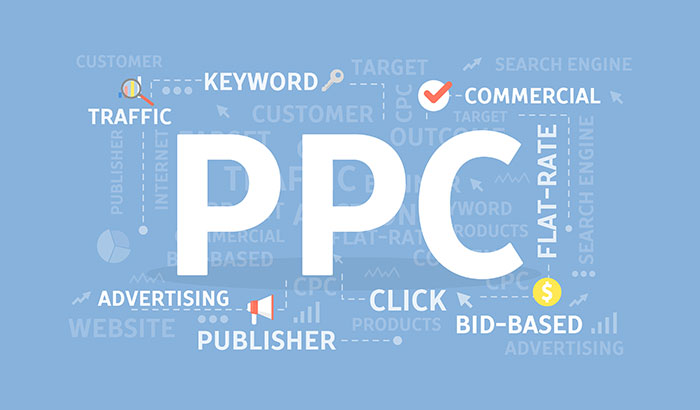If you want to grow your business, it might be time to launch a PPC campaign. A PPC (Pay-Per-Click) campaign is a type of online advertising that can help your ads be seen by your target audience and potential customers.
PPC campaigns display ads to people who search specific keywords related to your business. Your site is the first option they’ll see when they search those keywords. PPC advertising is different from traditional advertising because, with PPC, you only pay when someone clicks on your ad.
If you’re gearing up to launch a PPC campaign for your business, we’ve outlined all the essential information you need to know before getting started.
Define Your Goals and Audience
Before you start planning a PPC campaign, it’s important to identify your goals. PPC campaigns can be complicated, so help get yourself started by answering these questions:
- What do I want to achieve with this campaign?
- Do I want it to drive more traffic to my site?
- Do I want it to generate more sales?
- Do I want it to increase awareness of my brand?
Many of those questions go hand in hand, but they’re important to ask and think about as you develop your strategy.
Once you know the main focus of your campaign, it’s important to set specific goals that can be measured over a period of time. Doing this will allow you to track your progress and adjust your strategy accordingly.
While defining your goals, it’s also important to determine who your target audience is. Who are you trying to reach with your PPC campaign? What are their needs and pain points?
Understanding the answers to these questions will help you create ads that resonate with your audience and increase your chances of success.
Keyword Research
Keyword research is a critical component of any successful PPC campaign. The goal of keyword research is to find keywords and phrases that your audience is likely to search for when looking for products or services like yours.
There are a few different tools you can use to do keyword research. These tools allow you to type in potential keywords and see how often those words are searched. While researching, look for words with a high search volume and low competition.
In addition to looking at the search volume and competition, you should also keep in mind the intent behind the keywords searched. For example, are they looking to buy a product or service? Or are they looking for information?
By understanding the intent behind the search, you can tailor your ad content and landing pages to meet the user’s needs and increase the likelihood of conversion.
Budget Planning
Setting a realistic budget ensures you can achieve your campaign goals while managing costs effectively. You’ll want to balance your spending with your ROI to get the most out of every dollar spent.
When planning your budget, the first step is determining how much you’re willing to spend on the campaign. This number will be based on your campaign goals and your business’s marketing budget.
Once you have a total budget in mind, you can allocate it across your various campaigns and ad groups. When allocating your budget, it’s important to consider the expected ROI for each campaign or ad group. If one ad group has a higher ROI potential than another, you may want to allocate a more significant portion of your budget to that group.
Throughout the campaign, regularly review the performance of the ads and adjust your spending to ensure that you stay within budget. PPC advertising costs can fluctuate, so keep an eye on costs as you put your campaign into action.
Ad Creation
Once you have the budget, it’s time to start the ad creation process. You want high-quality ads that catch your audience’s attention, communicate your message, and encourage them to take action.
The trick is that you don’t have much space to communicate all of that. Your copy should be short, to the point, and attention-grabbing. It should quickly communicate what your ad is about and why it’s relevant to the user’s search query.
Another crucial aspect of ad creation is ensuring your ad is highly relevant to the user’s search query. This means using highly targeted keywords and tailoring your ad content to match the user’s intent behind the search. If your target audience is searching for a specific product, your ad should highlight that product.
Once your ad is up, watch the click-through rate. Low click-through rates may indicate that your ad copy or targeting needs to be adjusted.
Landing Page Optimization
The landing page is where the magic happens – it’s where your target audience ends up after clicking on your ad.
Arguably the most important part of any PPC campaign, the landing page should be visually appealing and highly relevant to the user’s search intent. This means providing a seamless user experience and a clear and compelling value proposition.
Make sure that your landing page is simple and actionable. You don’t want to overwhelm your audience with too much information, and you want to make sure that they’re provided with a clear call to action that encourages the user to take the next step. For example, the “next step” could include filling out a form, making a purchase, or requesting more information.
If you have a high click-through rate but a low conversion rate, you should optimize your site to make it more user-friendly.
Campaign Management and Analysis
The work doesn’t stop once you have your campaign up and running. To make sure that you get the most out of your campaign, you must constantly monitor and analyze it, making adjustments as needed. Look at the click-through rate, the conversion rate, the cost per acquisition, and other metrics.
As you track your goals and analyze the data, you can gain insights into what’s working and not working and decide how to optimize your campaign.
Grow Your Business With Revity
At Revity, we’re passionate about helping businesses like yours achieve their full potential. If you need help growing your online presence through a PPC campaign or other marketing needs, Revity’s marketing experts are ready to help with innovative, results-driven solutions.
Contact us today to discuss how we can help your business grow!





